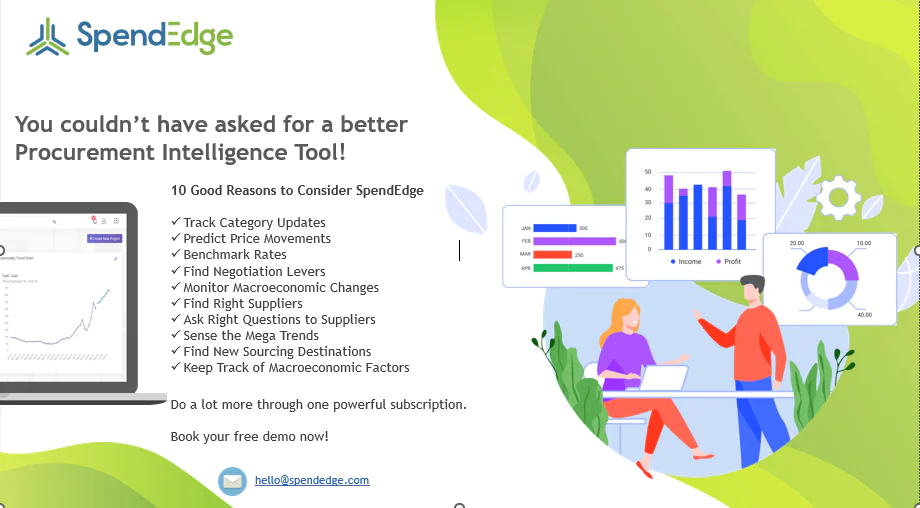Key Takeaways on Challenges in Logistics Sourcing
- Challenges in logistics sourcing such as fluctuating fuel prices, regulatory compliance, and technology adoption pose significant hurdles for procurement teams in the freight and logistics industry.
- Optimization technology in logistics sourcing enables businesses to reduce risks, respond rapidly to market changes, simplify complex processes, increase speed and scalability, and boost savings potential.
- Automation and artificial intelligence play a crucial role in streamlining logistics sourcing processes, enhancing responsiveness, and navigating rapidly changing markets.
- SpendEdge offers solutions for price tracking and forecasting, regulatory adherence, visibility into market trends, and negotiation strategies, assisting freight and logistics companies in optimizing their procurement processes and achieving cost savings.
One aspect of supply-chain procurement in freight and logistics involves acquiring goods, which includes purchasing necessary products, selecting suppliers, and considering factors such as price, quality, delivery date, and payment terms for the production and sales departments. Another aspect is managing storage space for the goods, both raw materials and finished goods to ensure they are readily available for production and distribution to customers. The third task is inventory management, determining the appropriate number of SKUs and frequency of supply orders to meet the organization’s production and marketing needs. In the logistics and transportation industry, procurement is crucial for cost management and effective supply chain optimization. It involves sourcing goods, services, and equipment at competitive prices to reduce operational costs and minimize disruptions. Vendor selection and management are also essential due to heavy reliance on third-party suppliers and service providers.
Potential Challenges in Logistics Sourcing for Freight Teams
Fluctuating Fuel Prices
Regulatory Compliance
Technology Adoption
Fluctuating Fuel Prices:
For transportation companies, fuel costs, particularly diesel, can create a major expense. Fluctuations in fuel prices can result in uncertainty in budgeting and negatively affect profit margins. Freight management companies can be heavily impacted by sudden spikes in fuel prices, leading to delays and severe consequences. Conversely, a sudden decrease in prices can lead to short-term profit increases and intense competition among providers to offer the best rates to consumers. To effectively manage fuel costs, procurement teams must explore options such as negotiating fuel contracts or adopting fuel-efficient technologies.
Regulatory Compliance:
The transportation sector is governed by a number of laws, including those pertaining to labor, environmental protection, and safety. Maintaining compliance with these rules can be challenging and may call for additional resources for enforcement and monitoring. Navigating the path toward regulatory compliance in the transportation industry is a complex and constantly changing process. With safety, security, sustainability, international factors, and technological advancements all playing a role in shaping the industry, transportation companies need to be proactive and strategic in their approach.
Technology Adoption:
Integrating new technologies into existing systems is a major logistics challenge, especially for larger companies with legacy systems, due to the complexity and time-consuming process it entails. As consumers demand faster, more convenient service, logistics companies are under pressure to keep up. To remain competitive, it’s crucial for procurement professionals to keep up with technological advancements like fleet management software, GPS tracking systems, and automation tools. This involves effectively assessing and implementing these technologies, which may require finding the appropriate vendors and negotiating contracts.
Read more: Mastering Logistics Procurement Strategy: Essentials for Effective Sourcing
Optimizing Technology in Logistics Sourcing: Explore the Benefits
Role of technology in logistics sourcing
- Reduce Risks Across Your Logistics
- Rapidly Respond to Market Changes
- Simplify Complex and Data-Laden Sourcing Processes
- Increase Speed and Scalability
- Boost Savings Potential and Improve Tracking
Reduce Risks Across Your Logistics:
Logistics Sourcing Optimization enables businesses to mitigate risks associated with transportation workforce shortages, distribution challenges, fluctuating oil prices, and fuel costs. By optimizing routes, modes of transportation, and carrier selection, companies can minimize disruptions and vulnerabilities in their supply chain, ensuring smoother operations even in uncertain environments.
Rapidly Respond to Market Changes:
With the aid of sourcing optimization, businesses can swiftly adapt to market changes, such as shifts in demand, regulatory requirements, or geopolitical factors affecting transportation. By leveraging real-time data and advanced analytics, companies can make informed decisions promptly, optimizing their logistics operations to meet evolving market demands and maintain competitiveness.
Simplify Complex and Data-Laden Sourcing Processes:
Logistics Sourcing Optimization simplifies complex procurement processes by automating data analysis and decision-making. By streamlining tasks such as carrier selection, rate negotiation, and contract management, businesses can reduce the administrative burden and increase efficiency in their logistics sourcing operations.
Increase Speed and Scalability:
By adopting optimization technology, businesses can enhance the speed and scalability of their logistics sourcing processes. Automated algorithms and machine learning capabilities enable rapid analysis of vast amounts of data, allowing companies to efficiently manage sourcing activities across multiple suppliers, routes, and geographies, without sacrificing accuracy or quality.
Boost Savings Potential and Improve Tracking and Forecasting:
Sourcing optimization technology unlocks significant savings potential by identifying cost-saving opportunities, optimizing freight procurement strategies, and negotiating favourable terms with carriers. Additionally, advanced tracking and forecasting capabilities provide greater visibility into supply chain operations, enabling proactive decision-making and better risk management.
Enhance your logistics sourcing strategy with actionable insights and measurable results. Connect with our experts today to drive efficiency, reduce costs, and stay ahead of industry challenges…
Modern Technology In Logistics Sourcing: Role
As logistics teams and transportation sourcing personnel face increasing workloads, they seek actionable intelligence rather than drowning in data. Software solutions offer a lifeline, automating tasks that would otherwise burden them. Consequently, procurement teams are embracing automation and artificial intelligence to navigate this turbulence. In the realm of logistics sourcing, optimization and automation prove invaluable, empowering buyers to swiftly respond in the spot buying process. Leading sourcing teams leverage optimization and AI-powered automation to adapt to rapidly changing markets. They’ve realized that beyond highly strategic endeavors like annual RFPs, other areas also reap substantial benefits from such technology.
How SpendEdge Tackles Challenges in Logistics Sourcing

Price tracking and forecasting:
Continuously monitor price changes for a vast array of commodities such as fuel that are used in transportation and logistics. With our intelligence solutions, you can effectively distinguish between high-risk and low-risk commodities. Make cost-sensitive sourcing decisions based on accurate pricing insights provided by our experts after conducting a proper cost analysis. Equip your category managers with valuable intel on commodity price trends and fluctuations framed by our experts. Get price forecasts for both short and long timeframes – weekly, monthly, quarterly, or even 6 and 12-month timeframes.
Regulatory adherence:
We can help businesses in gaining an understanding of the regulatory environment in various regions. assisting customers in finding vendors that adhere to rules and have all required certifications and permissions in place. We help you gather relevant data on suppliers’ GHG emissions from across projects and facilities, discover useful patterns, compare with industry benchmarks, and realize emission reduction targets.
Visibility into market trends:
At SpendEdge our experts help companies get visibility into the latest technological innovations and trends in the market by investing in supplier and supply chain market intelligence. Supporting them in identifying suppliers who are technologically advanced and can provide quality service to their customers. Also, you can get a comprehensive understanding of all kinds of the latest technologies being adopted by peers in the industry. Gain access to deep drilldowns and dashboard overviews of supply chain metrics and patterns; identify chances to enhance procedures and boost efficiency while minimizing hazards.
Unlock smarter logistics sourcing strategies with SpendEdge—boost efficiency, reduce costs, and stay ahead of market challenges…
How SpendEdge Transformed Sourcing for a Logistics Company
After the introduction and expansion of e-commerce, sourcing in the transportation and logistics sector has seen significant improvements. The need for logistics and transportation has increased as a result of the rising demand for online goods. With all these changing tendencies, a better procurement function was required.
Client Background
A US-based transportation and logistics company engaged with SpendEdge as they wanted to identify and develop effective negotiation opportunities with the leading cloud service providers in the market. They also wanted to understand and benchmark key vendors’ cloud offerings in terms of features, price, and services.
Solutions Offered
We supported the client’s IT procurement teams in coming up with a best-in-class renegotiation strategy (outside potential spending) with the target cloud service providers. The client was provided with complete information on the various aspects including the cloud services discounting options, SLA assessment, price among top players, price comparison, things to consider while negotiating with cloud service providers, and many more.
Impact Delivered
At SpendEdge the company was provided recommendations on the best negotiation strategies that can be adopted by the client to get the best price in the market. The client gained a good comparison of the prices that are being offered by different service providers. Helped the client in getting a detailed explanation of who would be the best-fit supplier of cloud services not only from a cost perspective but also from a services and quality perspective.

Conclusion
In conclusion, the landscape of logistics sourcing and procurement in the transportation industry is evolving rapidly, presenting both challenges and opportunities for businesses. From navigating transportation workforce shortages and distribution challenges to managing fluctuating oil prices and fuel costs, effective budget management and sourcing optimization are essential to drive efficiency and savings potential. By leveraging advanced tracking and procurement technologies, businesses can enhance visibility into market trends, mitigate risks, and rapidly respond to changing market dynamics. With the support of solutions like SpendEdge, companies can harness actionable intelligence to optimize sourcing strategies, unlock savings potential, and achieve regulatory compliance in the dynamic freight procurement market. Through collaborative efforts and strategic partnerships, businesses can navigate the complexities of logistics sourcing, improve supply chain resilience, and drive sustainable growth in the ever-evolving transportation industry.
Optimize your logistics sourcing, overcome industry challenges, and drive measurable savings…




